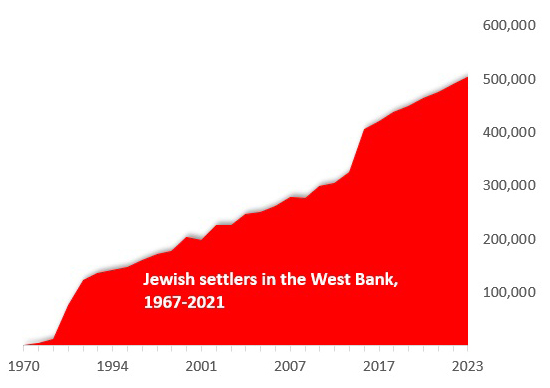The Hamas-Israel War reflects the failure of 50 years of U.S. geopolitics in the region. Ultimately, the problem stems from the occupied territories, their Jewish settlers and apartheid policies.
After the Yom Kippur War, Israel’s Labor coalition began to intensify the expansion of the boundaries of Jerusalem eastward. This encouraged a group of Messianic settlers to create a foothold in the West Bank, including Ma’ale Adumim by the group Gush Emunim. These religious far-right Jews were met with protests by the peace activists.
Ever since then, the Jewish settlements have been a time-bomb that could subvert Israeli democracy and endanger Israel’s Jewish and Arab citizens and Palestinians. It has unleashed apartheid policies and contributed to a cycle of “forever wars” in the region.
One of the founders of the Israeli peace movement was the late novelist Amos Oz. He was among the first Israelis to advocate a two-state solution to the Israeli-Palestinian conflict. He also warned of the dangers of the occupation already back in 1967 calling the radicalized settlers neo-Nazis. As he put it, “Even unavoidable occupation is a corrupting occupation; an enlightened and humane and liberal occupation is occupation.”
West Bank settlements, apartheid regime
The Jewish settlements have fostered a de facto one-state reality in Israel, wherein Israelis have rights and Palestinians don´t. Meanwhile, talks for a two-state solution have been stalling since 2014. Rhetoric aside, Netanyahu’s government has “engaged in actions that annex the West Bank and threaten the prospects for a just and lasting resolution to the Israeli-Palestinian conflict.”
In the past, periods of heightened security tension and military operations have ensured an opportunity for settlers to establish facts on the ground. After the brutal attack by Hamas, the alarming trend of increased settler violence has rapidly escalated.
Here’s a reality check: Nothing has halted the settlers’ steady expansion since the late 1960s and the Israelis’ expansion in East Jerusalem.

Source: Peace Now/ICBC
In South Africa, the system of apartheid, based on white supremacy and racial segregation, was in place from 1948 until 1994. In April 2021, the Human Rights Watch warned that Israel had crossed the apartheid threshold. In early September this year, the ex-chief of Mossad, Tamir Pardo, said that Israel’s mechanisms for controlling the Palestinians matched the old South Africa. “There is an apartheid state here,” since “two people are judged under two legal systems.”
Even amid the peace talks in Oslo in the early ‘90s, Palestinian per capita income was just 15% relative to the Israeli level. But hopes for peace died with the Jewish far-right assassination of Prime Minister Yitzhak Rabin.
Despite all the hoopla by the Trump and Biden administrations that the Middle East is at the cusp of peace and prosperity, Palestinian per capita income has fallen and is now only 12.9% relative to the Israeli level; lower than decades ago.
As bad as these aggregate figures are, they reflect Palestinian averages, not Gaza’s hell. Years of isolation and recurrent conflicts have left the local economy far behind the West Bank’s, due to the Israeli-imposed blockade, four wars, and domestic divisions.
Gazan per capita income is now less than a third of that in the West Bank. Half of the labor is unemployed; over half of the population lives below the national poverty line.
Apartheid rule
Long before the Hamas offensive, Palestinian stagnation reflected economic ruin that was excessive even relative to apartheid South Africa.
During the apartheid (1948-94), the blacks’ per capita income relative to the whites climbed from 8.6% to 13.5%. In relative terms, the Palestinians’ starting point relative to Israelis was almost twice as high after the Oslo Accords. But today it’s behind that of the blacks at the end of the apartheid. The reversal occurred under the watch of the Trump and Biden administrations.
From Apartheid South Africa to West Bank/Gaza

Source: Author, data from IMF
Farsighted Israeli leaders no longer deny the reality of apartheid. Last year, former attorney general Michael Ben-Yair called Israel “an apartheid regime.” Recently, the parliament’s former speaker Avraham Burg and renowned historian Benny Morris were among more than 2,000 Israeli and American public figures who signed a public statement that “Palestinians live under a regime of apartheid.”
In retrospect, the peace efforts in Israel have been vital and inspiring, but no match to the settlement policies that have been legitimized in terms of national security interests and fueled by U.S. Big Defense. Like the peace movement, international community considers the settlements a violation of international law. Yet, hawkish advocates of national security favored their expansion.
Currently, the settlers are escalating anti-Palestinian violence and dreaming of mass expulsions in the West Bank. For all practical purposes, they have won. In the early 1970s, there were barely 2,000 settlers in the West Bank. Today, that figure exceeds 500,000.
Their problem is that they will never win the peace.
Dr. Dan Steinbock is the founder of Difference Group and has served at the India, China and America Institute (US), Shanghai Institute for International Studies (China) and the EU Center (Singapore). For more, see https://www.differencegroup.net.
The original 6,400-word analysis was published by The World Financial Review on Oct 19, 2023, see https://worldfinancialreview.com/whats-behind-the-hamas-israel-catastrophe


